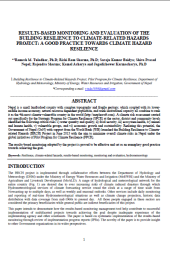Results Based Monitoring and Evaluation of the Building Resilience to Climate-related Hazards Project: A Good Practice Towards Climate Hazard Resilience
Summary
The research paper is related to Nepal, a small landlocked country with a challenging geography and fragile geology, which was considered the 4th most climate-vulnerable nation in the world. A climate risk assessment was conducted for the Strategic Program for Climate Resilience (SPCR), revealing critical risks in areas such as water, food security, ecosystems, health, vulnerable groups, and economic sustainability. In response, the Government of Nepal, supported by the World Bank, launched the Building Resilience to Climate-related Hazards (BRCH) Project in June 2013. The project aimed to reduce climate risks as part of the global Pilot Program for Climate Resilience (PPCR). Its results-based monitoring approach proved effective and served as a valuable example of best practices in achieving its objectives.
Categories:
Journal, Research Paper
Published Year:
2017
